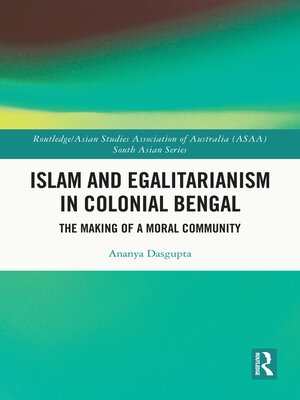Islam and Egalitarianism in Colonial Bengal
ebook ∣ The Making of a Moral Community · Routledge/Asian Studies Association of Australia (ASAA) South Asian Series
By Ananya Dasgupta

Sign up to save your library
With an OverDrive account, you can save your favorite libraries for at-a-glance information about availability. Find out more about OverDrive accounts.
Find this title in Libby, the library reading app by OverDrive.



Search for a digital library with this title
Title found at these libraries:
| Library Name | Distance |
|---|---|
| Loading... |
This book is a historical exploration of the social and cultural processes that led to the rise of the ideology of labor as a touchstone of Bengali Muslim politics in late colonial India.
The book argues that the tremendous popularity of the Pakistan movement in Bengal is to be understood not just in terms of "communalization" of class politics, or even "separatist" demands of a religious minority living out anxieties of Hindu political majoritarianism, but in terms of a distinctively modern idea of Muslim self and culture which gave primacy to production/labor as the site where religious, moral, ethical, as well as economic value would be anchored. In telling the story of the formation of a modern Muslim identity, the book presents the conceptual congruence between Islam and egalitarianism as a distinctively early twentieth-century phenomenon, and the approach can be viewed as key to explaining the mass appeal of the desire for Pakistan.
A novel contribution to the study of Bengal and Pakistan's origins, the book will be of interest to researchers studying South Asian history, the history of colonialism and end of empire, South Asian studies, including labor studies, Islamic Studies, and Muslim social and cultural history.







